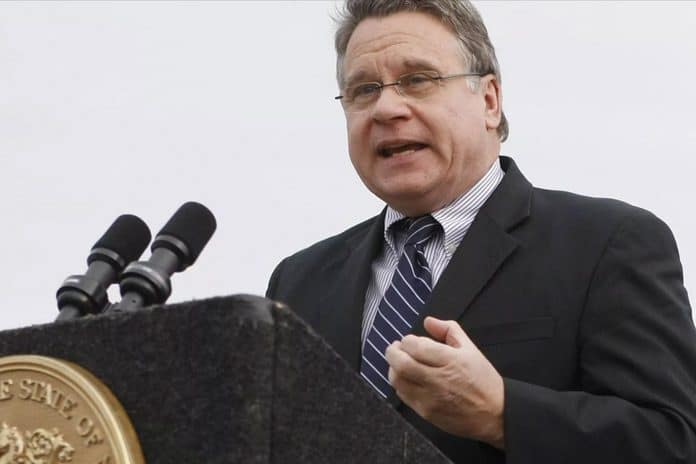
COLTS NECK – A recording of Congressman Chris Smith (R-4th) giving his opinion against same-sex couples adopting has become a political talking point in the midterm election.
Smith was speaking to a crowd of students at Colts Neck High School. He spoke about a variety of topics, including bipartisanship, and laws to combat Lyme’s disease and human trafficking. Then, the students had time to ask questions. They asked about his opinion on the political climate in Washington and his opinion on the media. One student asked about adoptions by same-sex couples, and two other students asked follow-up questions later. (The relevant conversation is transcribed below.)
In the audio, Smith is clear about his opinion that male-female marriages are better for children, but does not think that children are better off in orphanages.
What Smith is concerned about is the “dirty political trick” of making an edited clip of the interaction with students mince his words. Smith argued that the clip doesn’t share the entire interaction, in which a student asks if orphanages and foster homes would be better for the child and he responds, “No. Lord, no.”
“Anybody can twist your words and make false representations when they splice up a tape,” Smith said in a statement. “It is despicable that someone thought they could score political points by distorting the truth and raising false questions about my record and the full range of topics discussed at the assembly.”
His opponent, Democrat Josh Welle, seized on the audio and his camp sent their own press releases.
(Audio courtesy of Art Gallagher at More Monmouth Musings)
“I fought on the front lines in the Navy after 9/11 to protect this Constitution and the liberties it guarantees for all people, not just some,” Welle said in the release. “Maybe if he had held a town hall in the last 25 years, Smith would know that the people of the 4th Congressional district will not stand for injustice and inequality. Not in 2018. Not in central Jersey.”
After reviewing the audio, Welle’s statement was: “Well, Chris Smith, if you would vote to deprive children from the opportunity to find a home with a loving gay couple, what options are you leaving these kids? Either get adopted by a straight couple…or stay in an orphanage. So, yes, it is fact you do believe kids should stay in an orphanage rather than be adopted by a loving LGBTQ family. Thank you for proving my point.”
A transcription of the entire interaction relating to same-sex adoption is as follows:
Student #1: In 1999, this is a while ago, but you voted “Yes” on banning gay adoptions in D.C. Do you still stand by that, and (inaudible)
Smith: Well, you know, my belief is – it’s a strongly held belief – in 2008, President Obama, he was then-Senator Obama, spoke at Saddleback Church, and I was in the front row, like these guys-ladies-can’t see, guys – and Barack Obama was asked a question about marriage. ‘Define marriage’ was the question put forward to him. And he said ‘I believe marriage is between a man and a woman, and he said ‘and God is in the mix.’ That was from Senator Barack Obama. Now he has changed. He now supports same-sex marriage. My belief is squarely where his used to be, that marriage is between a man and a woman.
And on adoption, adoption is all about the best interests of the child. Now there are people who feel the best interest of the child is for gay couples to adopt. I really believe that the best interests, you find a home where they are more likely – I mean, the home study that is done takes in all kinds of factors, and I would vote the same way, frankly, as I did then.
But you know there’s something that’s happened that there’s little concern from the LGBT community, which I find disconcerting. And that is that a lot of the best organizations for adoption have been put out of business because of their refusal, like in D.C., to facilitate such adoptions. Catholic Charities, which is one of the greatest humanitarian organizations in the United States for poor, for disabled, and for adoptions, they have been now denied the ability to do any adoptions in D.C., in Illinois, in Massachusetts, and in some other states, because they believe the best interest of the child is not that kind of adoption.
Student #1: So you would say that foster care and orphanages would be in the better interest of the child-
Smith: No! Lord, no! We have waiting periods for families to adopt children, often by years, but certainly long waiting periods of couples who’d love to adopt, but the child is simply not available.
And, you know, on adoption, I’ll give an example of one of the reasons why I voted against the tax bill that was just up. Not only did the SALT provisions, where our deductions locally would be capped at $10,000, and that was the primary reason, but early on, there was an elimination of the Adoption Tax Credit. Why is that important? In 1989, I introduced legislation – totally bipartisan, I had 100 cosponsors on my bill – to provide for adoption, via tax credit, of $5,000 for what we call non-recurring expenses. And those expenses are the kind that somebody says ‘Oh I want to adopt but I just don’t have the wherewithal.’ Tax credits are dollars in your pocket, it’s not a deduction, it’s dollar-for-dollar. It’s now about just under $14,000, as a credit. When the Contract for America came up, led by Republicans, I put the tax credit into that big omnibus bill, and it’s been the law of the land ever since.
I’m very, very aggressively pro-adoption, and when our leadership put an elimination of the tax credit for adoption into the tax cut bill, I led an effort – did a letter, met with the Speaker, met with everyone else involved, the Chairman of the Ways and Means Committee – and was able to get that off the cutting block. So I do think adoption is a – but large numbers of Americans now overseas, because there is a dearth of children, many are willing to take sibling groups, which is great, and those with special needs are also being adopted in large numbers.
Student #2 (Later in the assembly): My sister is gay, and she’s talked about wanting to adopt a child one day with her partner, and I just wanted to know if you think that based on household studies she would be less of a legitimate parent and why she couldn’t have –
Smith: Well again, you know, the issue, legally, is moot, at this point, especially with the Supreme Court decision. And she’s free to adopt.
Student #2: Right, but why do you think she shouldn’t be able to adopt a child?
Smith: I think you’re getting to – I do believe that there are many others who would like to adopt who can’t acquire a child. As I said, the waiting periods are extremely long, and –
Student #3: Okay, so what makes them more legitimate than her sister, those other people waiting for a child?
Smith: In my opinion, a child needs every possibility of – somebody mentioned orphanages before, orphanages are still a possibility for some kids, but –
Student #3: You’d rather have kids in an orphanage than with –
At this point, the student was interrupted by an adult asking Smith to talk about the late Sen. John McCain. The topic didn’t return to the issue before the hour-long event was wrapped up.






